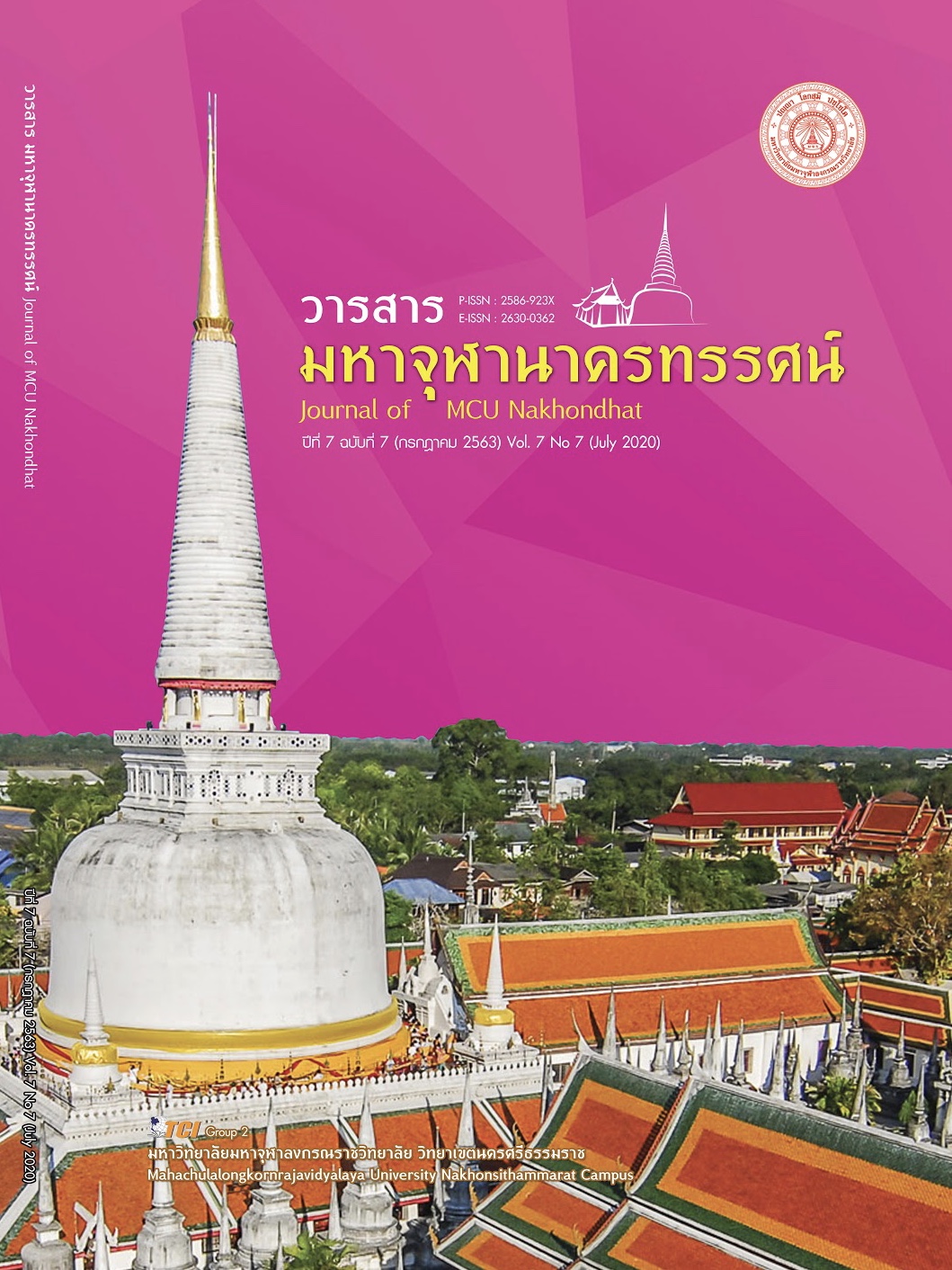AN ANALYTICAL STUDY OF THE USE OF BUDDHIST PRINCIPLE IN THE MULTICULTURAL SOCIETY OF KHLONG KWANG COMMUNITY KHLONG – KWANG SUB – DISTRICT NATHAWEE DISTRICT, SONGKHLA PROVICE
Main Article Content
Abstract
The objectives of this study are :To study the sociocultural context of Khlong Kwang community, Khlong Kwang sub – district, Nathawee district, Songkhla Province. 2) To study the coexistence factors of the multicultural society of Khlong Kwang community, Khlong Kwang sub – district, Nathawee district, Songkhla Province. 3) To study and analyze the application of Sangaha Vatthu 4 as the principles for living in the multicultural society of Khlong Kwang community, Khlong Kwang sub – district, Nathawee district, Songkhla Province.This is qualitative research focusing observation and in – depth interviews presenting by a descriptive method.
The results of the study were: 1) Khlong Kwang community is the multicultural community that is aged approximately 200 years. It is located in the border of Thailand and Malaysia. The locals way of life are relate to the nature, religion, beliefs and rituals. 2) People are related to each other as relatives. 8 social factors that affected to the relationship and the coexistence of people in Khlong Kwang multicultural community are: settlement geography factor, educational factor, occupational factor, political factor, ethnic and relative factor, community service access factor, religious and beliefs factor, traditions and rituals factor, and technological factor. 3) The way that Khlong Kwang community applied Sangaha Vatthu 4 as the principles for living is compatible for the community context which is multicultural community. Thus, the coexistence in Khlong Kwang community, people must use Sangaha Vatthu 4 (4 principles of service) are Dana: giving and sharing with others, Piyavaca: speak politely, Atthacariya: helpful action, and Samanattata: behaving equitably toward all people.
Article Details
References
พระครูปลัดไพรัช จนฺทสโร และคณะ. (2558). การอยู่ร่วมกันของชุมชนชาวพุทธและมุสลิมในเขตพื้นที่อำเภอเทพา อำเภอสะบ้าย้อย อำเภอนาทวี และอำเภอจะนะ จังหวัดสงขลา. ใน วิทยานิพนธ์พุทธศาสตรมหาบัณฑิต สาขาวิชาพระพุทธศาสนา. มหาวิทยาลัยมหาจุฬาลงกรณราชวิทยาลัย.
พระพรหมคุณาภรณ์ (ป.อ.ปยุตฺโต). (2550). การพัฒนาที่ยั่งยืน. (พิมพ์ครั้งที่ 6). กรุงเทพมหานคร: โรงพิมพ์บริษัทสหธรรมิก จำกัด.
พระมหานพดล ปญฺญสุวฑฺฒโก. (2560). การอยู่ร่วมกันของคนในสังคมพหุวัฒนธรรม: กรณีศึกษาชุมชนเขตบางรัก กรุงเทพมหานคร. ใน รายงานการวิจัย. มหาวิทยาลัยมหาจุฬาลงกรณราชวิทยาลัย.
พระสุนทร ธมฺมวโร (บุญคง). (2561). การประยุกต์ใช้หลักสังคหวัตถุ ๔ ในชุมชนวัดหนองสนม จังหวัดระยอง. ใน วิทยานิพนธ์พุทธศาสตรมหาบัณฑิต สาขาวิชาพระพุทธศาสนา. มหาวิทยาลัยมหาจุฬาลงกรณราชวิทยาลัย.
องค์การบริหารส่วนตำบลคลองกวาง. (2561). แผนยุทธศาสตร์การพัฒนา. สงขลา: สำนักงานองค์การบริหารส่วนตำบลคลองกวาง.
อมรา พงศาพิชญ์. (2542). วัฒนธรรม ศาสนา และชาติพันธุ์: วิเคราะห์สังคมไทยแนวทางมานุษยวิทยา. กรุงเทพมหานคร: จุฬาลงกรณ์มหาวิทยาลัย.


